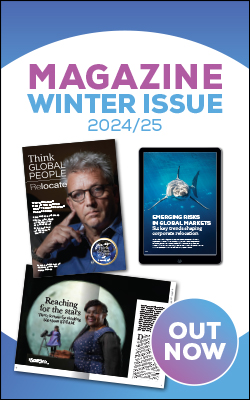Assessing risk and the role of trust: managing in a world of global uncertainty
Business today operates in a highly uncertain world. The information needed to service the deployment of personnel effectively to meet business objectives is not always complete. So the risks associated with global mobility are high but must be addressed to achieve organisational success. Trust can play an important role in risk management. Dr Sue Shortland explains.

– the must read for HR, global managers and relocation professionals.HR leaders need awareness of global risk and to demonstrate actions to manage in an environment where organisations increasingly have little control. Risk can be found internally within organisations, affected by leadership priorities and actions. Risk not only operates at firm level but also within the industry group in which the firm is located and in the global sphere where all businesses function. While organisations have some degree of control over risk at the leadership and firm level, and perhaps can have some influence at industry or sector level (if they are a major player for example), they experience inability to control risks determined globally. As such, organisational effort is often focused on leadership of the firm, while only keeping a watchful eye on global risk context. It is human nature to ignore risks that we cannot control. But geo-political global events pose a high level of risk to businesses today and as such we need to identify risk factors more effectively. This is particularly important for global mobility professionals who have responsibility for the deployment and well-being of staff working across the globe, increasingly in emerging economies where firms lack the infrastructure to support - and the experience of managing - expatriate and local workforces.Changing behaviours in terms of identifying and mitigating risk is not straightforward. As Artumo Bris, Professor of Finance at the IMD World Competitiveness Center speaking at the CIPD’s annual conference highlighted, while people are generally risk-averse, human biases can make us over-confident. Over-confidence is a fatal leadership flaw – ignoring the possibility of extreme events is a perilous course of inaction as extreme events do happen and these can eliminate businesses. It is therefore important to assess global risks and enact protective measures. While fostering a culture of wider global risk awareness and balancing the imperatives of ethics and compliance, a customer-centric focus remains crucial. Drawing upon values and ethics can help to shape and drive forward decision-making, taking into account levels of risk ranging from local to global. With risk awareness as the backdrop and using influence as a tactic to bring about change, principles-based leadership should be able to address both good and bad times, balancing risk with value creation.
Managing risk
To assess risk effectively and manage it successfully, it is important to promote thinking about the outside world and model scenarios, train people on these models and provide good quality information and intelligence so that appropriate decision-making is possible. Asking people to make a significant change to their behaviour may not deliver the desired response. Encouraging and influencing behavioural change, for instance via small ‘nudges’, can be more effective. To do this, leaders can use incentives rather than penalties and change the environment in which actions are taken so that people adapt their behaviour to align with the new environmental conditions.The global mobility profession works in the international environment on a day-to-day basis and is therefore well-positioned to alert their organisations’ leadership of global risks in relation to the deployment of personnel. ‘Nudging tactics’ to change the environment and thereby shape behaviours towards becoming more risk aware/adverse can include highlighting the operational and societal cultures in which internationally mobile personnel and their families work and live. Drawing attention to current risks such as compliance requirements and ethical issues such as reconciling cultural differences in managing business decisions can alert leaders to the strategic understanding that global mobility function possesses. Keeping abreast of global change in legislative requirements can mitigate the risk of exposing firms to undesirable outcomes such as negative publicity, and legal and financial penalties.- Join Relocate Global and our Think Women community for an interactive morning at the International Women’s Day Lunch on Fri 8th March
- Network, learn from global leaders and develop ideas and solutions to global mobility challenges at our interactive the Festival of Global People 2019 on Tue 14 - Wed 15th of May
The role of trust
While organisational personnel can do their very best to keep abreast of uncertainty, they can never be completely protected from risk. As human beings we manage this with some reliance on trust. Trust is a highly contextual concept and is thus extremely subjective. We make use of signals and clues to determine trustworthiness and use these to bridge gaps in our knowledge and understanding of people and situations. Placing trust though relies upon us believing that we have sufficient information to do so – but in reality we seldom have the complete picture in terms of relevant information and understanding. So, as Rachel Botsman of Saïd Business School speaking at the CIPD’s annual conference explains, in our efforts to reduce risk, we need to make smarter trust-based decisions.Trust can help us to make the leap from the known to the unknown and thereby open up new markets, introduce and develop new ideas and take forward change programmes. Exposure to the risk that change brings matters to people when that risk presents a potential loss. Individuals have different propensities to accept risk, reflecting their state of trust. For some risk presents a barrier to change, for others it is acceptable, for yet others change and the risks that this brings are exciting and to be embraced wholeheartedly. When employees are in these different trust states, change programmes are unlikely to work effectively or may fail. Trust is necessary to enable people to cross the bridge from the known to the unknown so developing a climate of trust is necessary to move organisations forward. In essence, to gain trust is to gain confidence in the unknown. Trust and risk are interdependent.- Aston Martin: Driving growth globally
- Towards an inclusive workplace: Fostering a culture of authenticity, inclusiveness and well-being
- International Health Insurance
- Business leaders embrace the future at the CBI National Conference
- Turning on the taps of global talent pipelines
Building or earning trust?
While organisations might try to build trust, it is important to recognise that trust is earned, and it is developed through daily interactions. Trust is earned in the smallest of moments, not through large magnanimous gestures and visible actions. Gaining trust is time-consuming but can be destroyed in an instant. It is therefore a precious asset. Transparency of organisational actions is typically considered to be a means of building trust. However if trust is viewed as a confident relationship with the unknown, then it can be argued that if there is a reliance on transparency and disclosure, the need for trust has been negated. Integrity is key to trust – the interests and motives of an organisation and its leaders must align with those of its people. If this can be managed across the scale of the business, it builds success and reduces reputational damage.For global mobility professionals, gaining the trust of relocating individuals and their families is absolutely critical to the successful deployment of personnel worldwide. Everyday actions, no matter how small, that provide reassurance and demonstrate care and compassion make a significant contribution to earning the trust of employees and families on the move. To manage relocating personnel, global mobility professionals rely heavily on evidence and information and this comes with a risk ‘price-tag’. Risk needs to be reduced and trust earned. Developing strong and capable working relationships between relocation services and global mobility/HR professionals relies on trust. Day-to-day interactions that discuss and resolve problems as well as those that share information and successes help to build trusting relationships and reduce risk. These relationships need to be developed across organisational and societal cultural boundaries and thus require depth of understanding and empathy.Thoughtful, evidence-based practice based on ethical approaches will help to reduce risk and gain trust. It is crucial that a principles-led approach to the mobility of employees and their families is adopted so as to create a trusting climate. This needs to be supported by daily interactions that recognise individual issues and respond to these empathetically. Policy guidelines are important to frame daily interactions and maintain cost control but decision-making that resolves the problems of individuals and their families in such a way that provides integrity and empathy will go a long way in trust building. And trust in their employer will enhance productivity and performance improving organisational returns.Organisations today are driven by time and tight margins as they relentlessly pursue global growth. Nonetheless, developing a culture that promotes integrity across the scale of business operations will be crucial to fostering a brand that is attractive to customers with products and services worthy of trust. And, as organisations build brands with embedded trust, so this helps to reduce one element of risk – namely that of negative customer perceptions of organisational integrity and the danger these can bring to financial returns.For related news and features, visit our Leadership & Management section.Relocate’s new Global Mobility Toolkit provides free information, practical advice and support for HR, global mobility managers and global teams operating overseas.
 Access hundreds of global services and suppliers in our Online Directory
Access hundreds of global services and suppliers in our Online Directory
©2025 Re:locate magazine, published by Profile Locations, Spray Hill, Hastings Road, Lamberhurst, Kent TN3 8JB. All rights reserved. This publication (or any part thereof) may not be reproduced in any form without the prior written permission of Profile Locations. Profile Locations accepts no liability for the accuracy of the contents or any opinions expressed herein.

































